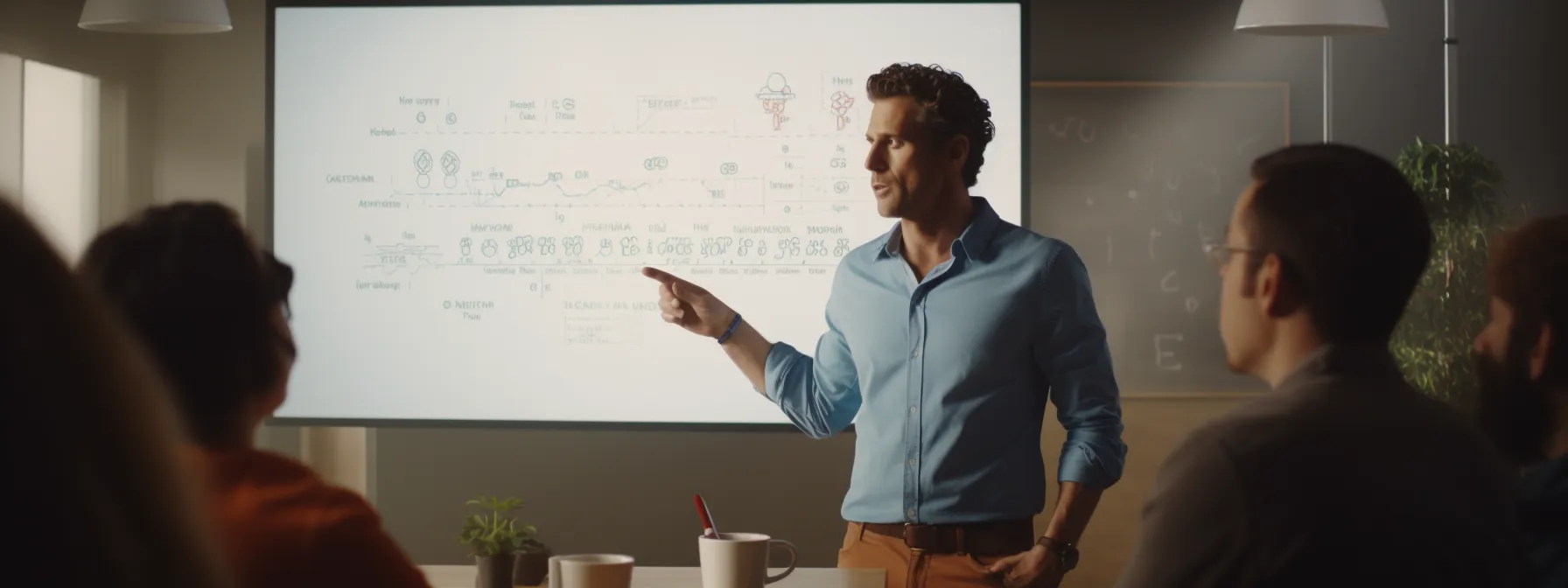Advanced SEO Keyword Optimization: A Comprehensive Guide to Strategic Techniques
Welcome to an educative journey into the world of advanced search engine optimization and keyword-specific strategies.
Let SEOTheory be your guide as we navigate the intriguing landscape of keyword research, its relevance in SEO, and advanced placement techniques.
Enhancing your SERP visibility through well-researched tactics, we leave no stone unturned in harnessing the untapped potential of keyword optimization.
Keep reading, as we uncover the myriad ways of creating structured content hubs, interlinking strategies and the art of crafting keyword-rich content.
Key Takeaways
- SEOTheory offers advanced SEO courses for beginners and experienced marketers
- The course covers Google’s four core ranking factors and how to improve website signals for each
- Learners will learn how to use software tools and AI to enhance semantic SEO, backlink profiles, content quality, and technical SEO health
- Keyword research tools are essential for crafting effective SEO strategies
- Strategic keyword placement, content localization, and internal linking are key elements of advanced SEO optimization
Introduction to Advanced SEO Keyword Optimization

SEOTheory is the pathway to a comprehensive understanding of advanced SEO strategies and techniques. This course, curated by SEO expert Manick Bhan, the creator of Search Atlas, offers a platform for beginners and seasoned marketers, inviting learners to delve into the vast world of search engine optimization (SEO).
A key focus of this course is the exploration of Google’s four core ranking factors. These are crucial to guiding your understanding of how to enhance your site’s signals. With expert insights from SEOTheory, learners will apprehend how a website’s ranking is determined and how they can positively impact their own site’s performance.
Digital tools and AI have revolutionized SEO practices. SEOTheory devotes time to teaching learners how to employ these for semantic SEO, improving backlink profiles, enhancing the quality of website content, and maintaining the overall health of their site from a technical SEO standpoint. It’s more than just SEO basics; it’s about mastering the art of optimization and strategizing.
In the realm of SEO, being a beginner doesn’t mean staying one. SEOTheory enables practitioners to level up, evolving their understanding of advanced SEO strategies. As learners develop their skills and put these techniques into practice, they can begin to see website traffic grow, ultimately driving revenue online.
Understanding the Essence of Keywords in SEO

Within the SEO ecosystem, keywords hold a pivotal place. They are the stepping stones that guide the searcher to your web page. SEOTheory places a high emphasis on keyword research, imparting the best practices to find the ideal keyword phrases that would benefit your website’s ranking.
Keyword research tools, as discussed in SEOTheory’s class, are essential components in crafting an effective SEO strategy. These tools help to identify search volume, search intent, question keywords, and focus keywords that dominate a particular industry or domain.
Understanding search behaviour is fundamental to SEO success. From site architecture to user experience, every aspect plays a role in improving your website’s visibility on the search engine results. SEOTheory enlightens learners not only on how to fix problems but also how to create a successful marketing strategy revolving around keyword optimization.
In addition, SEOTheory also covers the importance of content localization, emphasizing creating content relevant to the target audience and within the context of their locales. This approach boosts user experience, which subsequently contributes to improved SEO traffic and higher search engine rankings.
How to Perform Advanced Keyword Research

The first route towards advanced keyword research, championed by SEOTheory, involves extensive exploration using keyword research tools. These tools empower marketers to discern high-performing search terms and relevant question keywords that resonate with searcher’s intent.
Another critical facet taught within the SEOTheory’s course encompasses the accurate analysis of search volume and the implementation of focus keywords. By understanding these pivotal elements, individuals can devise potent SEO strategies that effectively elevate their website’s search engine ranking.
SEOTheory’s advanced keyword research also champions the importance of content relevancy in relation to targeted audiences and their specific locales. Exploiting this strategy optimizes user experience and consequently, induces higher SEO traffic.
The course firmly propounds the role of data analysis in keyword research. Through this, marketers can skillfully interpret web metrics, understand SEO metrics, and leverage the dedicated SEO content accordingly, thereby fulfilling the ultimate objective of search engine optimization.
Exploring Long Tail Keywords for SEO

The exploration of long-tail keywords plays an essential role in advanced SEO strategy, a principle firmly upheld in the teachings of SEOTheory.
By focusing on longer, more specific keyword phrases, individuals can reach a more targeted audience and enhance their site traffic.
Manick Bhan’s expert guidance within this course encourages the utilization of targeted long-tail keywords, empowering website owners to compete effectively, even amidst larger and more established businesses.
The seamless combination of these keywords into blog posts or landing pages can result in an upsurge of organic search traffic and higher search engine ranking, emphasizing the tangible benefits long-tail keywords offer in the realm of SEO.
Incorporating Synonyms and Related Terms in Your Content

SEOTheory elucidates the power of using synonyms and related terms in content. This refreshing technique not only augments the depth of your content but also broadens the spectrum of relevance within a search engine. In the vast search engine land, this strategy proves to help websites gain a more robust presence, carving out a unique, well-defined space amidst a sea of content.
The course empathetically instills the importance of context and relevancy in the use of synonyms and related terms. Businesses and content marketers learn how diversifying terms used within their content can significantly improve their SEO, drawing from a larger pool of potential search phrases and directly enhancing search engine results.
Manick Bhan, understanding the intricate relationship between content localization and search engine optimization, emphasizes the use of locale-specific synonyms. This approach undoubtedly uplifts user experience, inspires engagement, and enhances search traffic.
SEOTheory’s teachings extend beyond theory, encouraging learners to embrace data analysis and performance analysis tools. These tools aid in understanding which synonyms and terms resonate with the target audience, enabling adaptation and continuous improvement of content strategy. Through these tools, SEOTheory’s course ensures that learners gain an edge in their SEO optimization efforts, boosting their marketing strategy.
Advanced Keyword Placement Techniques

SEOTheory advocates for strategic keyword placement techniques, which are paramount in increasing a site’s visibility in search engine results. Manick Bhan, with his wealth of expertise, educates learners on the art of weaving focus keywords seamlessly into their website content. This includes the crucial elements of title tag, landing page and web page content, and anchor text.
The course delves into the technique of incorporating keywords naturally, to cater to Google’s search engine algorithms. It encourages learners to place keywords in the initial phases of their content, thereby enhancing the chances of a higher search engine ranking. This deft handling of keyword placements is one way to transcend from SEO beginner to an SEO expert.
SEOTheory demonstrates the importance of matching keywords to search intent. In this regard, the course trains learners to identify ‘intent keywords’, enabling them to fulfill the searcher’s needs more accurately. Balancing the right keywords with providing valuable information will dramatically enhance the user experience.
Learners are also acquainted with the best practices for advanced keyword placement within the schema markup of a webpage. This encourages increased site traffic by enhancing a page’s visibility in SERP. SEOTheory’s approach is dedicated to empowering its students, paving the way for them to master the strategic art of SEO.
Role of Strategic Internal Linking in Keyword Optimization

SEOTheory stresses the influential role of strategic internal linking in keyword optimization. Intelligent internal linking, or creating links between different pages on the same website, provides clear navigation paths and enhances the user experience.
Curated by the brilliant Manick Bhan, learners of this course will understand that well-defined internal linking structures increase site traffic by making the website easier for both users and search engines to navigate. This directly influences the website’s visibility and ranking in search engine results.
Importantly, SEOTheory places emphasis on the articulate use of anchor text in internal links. Anchor text that contains focus keywords and related terms can significantly improve your web page’s connection with search intent, clarifying the purpose of the link to search engine algorithms.
The course promotes the use of performance analysis tools to gauge the efficiency of links and recommend tweaks or shifts as needed. Balancing strategic internal linking with optimal keyword usage, SEOTheory’s teachings arm learners with advanced techniques enhancing overall search engine optimization strategies.
The Art of Creating Keyword Relevant Content

In the realm of SEO, SEOTheory heralds the significance of creating keyword relevant content. The insightful course developed by Manick Bhan explains the mechanism behind embedding focus keywords and related terms into your content in an organic manner that appeals to both users and search engines.
Knowledge of keyword research tools, which aid in filtering high-performing search terms, finds a prime spot in SEOTheory’s teachings. Users learn the importance of integrating these keywords into content strategies to enhance the visibility and ranking of their web pages.
SEOTheory offers insightful tutorials on the following aspects of content preparation:
- Understanding the searcher’s intent
- Usage of question keywords
- Identifying high-performing search terms
- Integrating focus keywords seamlessly into the content
- Creating engaging and user-friendly content
The course further emphasizes the significance of utilizing synonyms and related terms. This strategy broadens the relevance of a webpage within the search engine, increasing its reach.
An understanding of local-centric content creation also finds a pivotal place in the teachings of SEOTheory. With content intricately tailored to suit specific locales, businesses can enhance user experience, potentially boosting SEO traffic and search engine rankings.
Maximizing SERP Visibility Through Keyword Optimization

SEOTheory, through its advanced SEO courses, champions the powerful role of keyword optimization in maximizing SERP visibility. Manick Bhan imparts proven strategies to optimize website content for enhanced visibility on search engine results pages.
Within the purview of SEOTheory, learners comprehend the correlation between strategic keyword usage and the visibility of their website on the search engine results page. The implementation of focus keywords, related terms, and search terms relevant to the target audience, can dramatically improve page rankings.
In the insightful teachings of SEOTheory, students learn the significance of optimizing title tags, meta descriptions, and URLs with target keywords. Such enhancement tactics directly enhance SERP visibility, driving substantial organic site traffic.
Moreover, the course encourages the adoption of performance analysis tools for continuous improvement. By analyzing the effectiveness of keyword optimization strategies and making necessary adjustments, learners can ensure sustained growth and visibility on search engine results pages.
Leveraging Topic Clusters for Enhanced Keyword Optimization

SEOTheory underlines the strategic advantage of utilizing topic clusters for greater keyword optimization. Manick Bhan introduces learners to the concept of topic clusters, shedding light on their importance in enhancing website context for search engines.
Within the framework of SEOTheory, learners explore how to group related content into topic clusters. This practice magnifies website relevance and authority on specific keyword phrases, considerably elevating website rankings in search results.
The course emphasizes the strategic co-relation between topic clusters and target keywords. By smartly aligning keywords within these clusters, businesses can potentially increase their website’s visibility and site traffic.
The art of organizing content around topic clusters is an effective SEO tactic in the SEOTheory curriculum. The concept of topic clusters, when applied correctly, aids businesses in carving a niche for themselves in the crowded SEO space, and positively impacting their search engine rankings.
Addressing Keyword Cannibalization Issues

SEOTheory places a significant emphasis on addressing keyword cannibalization issues in its advanced SEO courses. Manick Bhan, with his vast knowledge, guides learners on how to identify, resolve, and prevent such critical issues from arising and inhibiting SEO performance.
This class sheds light on how multiple pages targeting the same keyword can lead to a negative impact on search rankings. Students learn to skillfully navigate this common problem, understanding that page relevancy and website authority are equally important to keywords used.
Keyword cannibalization isn’t just about competition between a site’s pages for the same keyword. It also delves into the miscommunication it sends to search engines, causing them to question which page is the most relevant. SEOTheory instructs learners on how to thread keywords intelligently, avoiding duplication and enhancing the clarity of their content.
SEOTheory also encourages the use of web metrics tools to detect keyword cannibalization instances. Students also learn how to adopt strategic content development, improve internal linking, and fine-tune their SEO strategy regularly, ensuring keyword potency, and diminishing the threat of cannibalization.
Improving Keyword Optimization With Content Features

Digitally savvy learners at SEOTheory receive in-depth schooling on lessons to enhance keyword optimization using content features. The course, steered by Manick Bhan, focuses on integrating various content features, such as infographics and interactive elements, into website content. This not only enriches the user experience but also helps search engines to better understand the context and relevance of the site.
The teachings promote the strategic blend of long-form content and visual aids, fortifying the grasp of the user interaction. By incorporating visually appealing and informative infographics, the course advocates for website content that holds the user’s attention and delivers the site’s message more effectively. This multi-faceted approach to content creation allows learners to fully engage users while hitting target keywords for optimal SEO implementation.
SEOTheory also touches upon the use of interactive elements such as quizzes and polls as part of a holistic content strategy. These, when embedded with focus keywords, not only enhance the user’s on-page time but also pave the way for improved search engine ranking. It’s a tactic that combines entertainment with education, maintaining user interest and delivering valuable information in digestible bites.
Finally, the course underscores the importance of utilizing advanced performance analysis tools to measure the effectiveness of these SEO strategies. Ensuring that content features stimulate user interaction and drive site traffic stand central to SEOTheory’s teachings. The ultimate goal remains to equip learners with the knowledge and skills to create content that meets the needs of both the user and the search engine algorithms.
Backlink Strategies for Keyword-Rich Content

SEOTheory underscores the significance of incorporating a strategic backlink approach to fortify keyword-oriented content. Manick Bhan expounds on how external links from reputable sources can impart credibility to your content, enhancing the search engine’s perception of your site’s relevance and authority.
The course dwells deep into how links with contextually relevant anchor text can boost the connectivity between your content and the target keywords. This strategy not only enriches the user’s experience through additional information but also bolsters your website’s search engine ranking.
In the realms of SEOTheory, learners will navigate the delicate balance between cultivating high-quality backlinks and avoiding the pitfalls of low-quality or spam links, which can have a detrimental impact on a website’s standing in the search engine algorithms.
Through SEOTheory’s comprehensive teachings, learners also explore how improvements in content quality – like enhanced readability and the inclusion of original research or insights – can naturally attract backlinks, thus, reinforcing their website’s authority and search engine ranking.
Unleashing Keyword Potential Through Structured Content Hubs

SEOTheory emphasizes the prowess of highly structured content hubs in optimizing keyword usage. Manick Bhan presents the correlation between well-architected content hubs and keyword potential, providing learners with an effective tool to take their SEO strategy up a notch.
In the realm of SEOTheory, content hubs are more than just collections of related content. Manick Bhan instills the perspective that these hubs serve as nexuses of relevancy, enhancing the site’s authority on certain keyword phrases and organically boosting search rankings.
Learners explore how meticulously-placed target keywords within these content hubs can result in increased visibility and site traffic. Exemplifying another clever SEO tactic, Manick Bhan’s guidance focuses on turning these content hubs into keyword optimization powerhouses.
Lastly, SEOTheory encourages the use of performance measurement tools in evaluating the effectiveness of content hubs. Immersing learners into a holistic approach, learners master the art of keyword optimization through structured content hubs.
Effective Use of Keyword Metrics in SEO Analytics

SEOTheory fosters the efficient use of keyword metrics in the realm of SEO analytics. Manick Bhan equips learners with the understanding that keyword metrics provide pivotal insights into a website’s performance, helping to shape a more effective SEO strategy.
Participants of the course imbibe how to use keyword research tools to track search volume, search intent, and the performance of focus keywords. These metrics form the foundation of any SEO strategy, guiding adjustments and improvements that can enhance search engine rankings.
Furthermore, Manick Bhan emphasizes the importance of using web metrics tools for tracking keyword performance. With this technique, learners can analyze how their SEO content is performing, enabling them to tweak their approach for maximum keyword potency.
The course also places significance on monitoring SEO metrics such as click-through rates and keyword rankings. Drawing from these metrics, SEOTheory empowers learners to heighten their SEO effectiveness, boosting visibility, and driving more organic site traffic.
Optimizing Mobile-Friendly SEO for Keyword Success
SEOTheory recognizes the paramount importance of optimizing SEO for mobile devices in today’s digital landscape. With the majority of online traffic coming from mobile users, it’s essential to ensure that your keyword optimization efforts extend to mobile-friendly content. This course imparts the significance of responsive web design, fast-loading pages, and user-friendly mobile experiences to improve search rankings and enhance keyword success.
In the context of mobile SEO, SEOTheory delves into the importance of voice search optimization. As voice-activated devices and virtual assistants become more prevalent, targeting voice search keywords is crucial. Learners gain insights into how to adapt their content to match the conversational queries users make through voice search, helping them reach a broader audience.
Moreover, the course emphasizes the significance of local SEO for mobile devices. Mobile users often search for products and services nearby, making local optimization a key element. SEOTheory guides learners on how to incorporate location-based keywords, create Google My Business profiles, and leverage mobile map services to ensure that their websites are easily discoverable by local mobile users.
Frequently Asked Questions
Elevate Your Visibility: Unlock SEO Success Today!
How can I effectively perform advanced keyword research for SEO?
To effectively perform advanced keyword research for SEO, utilize a combination of tools such as keyword research tools, Google Analytics, Google Search Console, and competitor analysis to identify high-volume keywords, long-tail keywords, and question keywords that align with your target audience’s search behavior and search intent.
What are long tail keywords and how can they be used in keyword optimization strategies?
Long tail keywords are longer and more specific keyword phrases that target a specific audience and have lower search volume. They can be used in keyword optimization strategies to attract targeted traffic and improve search engine rankings.
How do synonyms and related terms contribute to keyword optimization in content?
Synonyms and related terms play a crucial role in keyword optimization as they help search engines understand the context and relevance of the content. By incorporating these variations, it increases the chances of ranking for a wider range of search terms and improving overall visibility in search engine results.
What are some advanced techniques for placing keywords strategically within content?
Placing keywords strategically within content requires a deep understanding of SEO best practices. Advanced techniques include incorporating keywords naturally throughout the content, optimizing meta tags and headings, using semantic SEO techniques, and leveraging related keywords and LSI (Latent Semantic Indexing) terms.
How does strategic internal linking impact keyword optimization efforts?
Strategic internal linking plays a crucial role in keyword optimization efforts by creating a strong information hierarchy within a website, improving website navigation for users and search engines, and signaling the importance of specific pages to search engines.
What role do user intent and search behavior play in keyword research and optimization?
User intent and search behavior are vital considerations in keyword research. Understanding why users search for specific keywords helps you tailor your content to provide what they are looking for, leading to better engagement and higher rankings in search results.
Can you explain the importance of competitive analysis in keyword research for SEO?
Competitive analysis involves studying your competitors’ keyword strategies. It helps you identify gaps, opportunities, and high-performing keywords that can inform your own keyword optimization strategy, giving you a competitive edge in search engine rankings.
How can I balance keyword optimization with creating high-quality and valuable content?
Balancing keyword optimization and content quality is crucial. Focus on creating valuable, informative, and engaging content that naturally incorporates keywords. Avoid keyword stuffing and prioritize the user experience, as Google rewards content that satisfies user needs.
Are there any ethical considerations when conducting SEO keyword research?
Ethical considerations in SEO involve avoiding black-hat practices like keyword stuffing, cloaking, or spammy link-building. It’s important to maintain transparency and honesty in your SEO efforts, following search engine guidelines to ensure long-term success.
What are the best practices for tracking and measuring the effectiveness of keyword optimization efforts?
To measure keyword optimization effectiveness, track metrics like organic traffic, keyword rankings, click-through rates, and conversion rates. Use tools like Google Analytics, Search Console, and SEO software to gain insights and make data-driven adjustments to your strategy. Regular monitoring and analysis are key to ongoing SEO success.
Conclusion
The “Advanced SEO Keyword Optimization: A Comprehensive Guide to Strategic Techniques” offers invaluable insights into the world of SEO.
Keywords, the core components of SEO, hold the power to guide searchers to your webpage.
The course, crafted by Manick Bhan, delves into deep insights on keyword research, the essence of long-tail keywords, usage of synonyms, and related terms, as well as strategic keyword placement techniques for optimal SEO performance.
Students also master the art of creating keyword-rich, relevant content, leveraging topic clusters for better optimization, addressing keyword cannibalization issues, and effectively using keyword metrics in SEO analytics.
The teachings underscore proper content structure, backlink strategies, and the value of content hubs.
As learners grasp these tactics, they can expect to see a growth in website traffic, ultimately leading towards improved SEO performance and enhanced online revenue.
By utilizing its teachings, one can navigate seamlessly in the SEO landscape, proving that starting a beginner doesn’t mean staying one.






